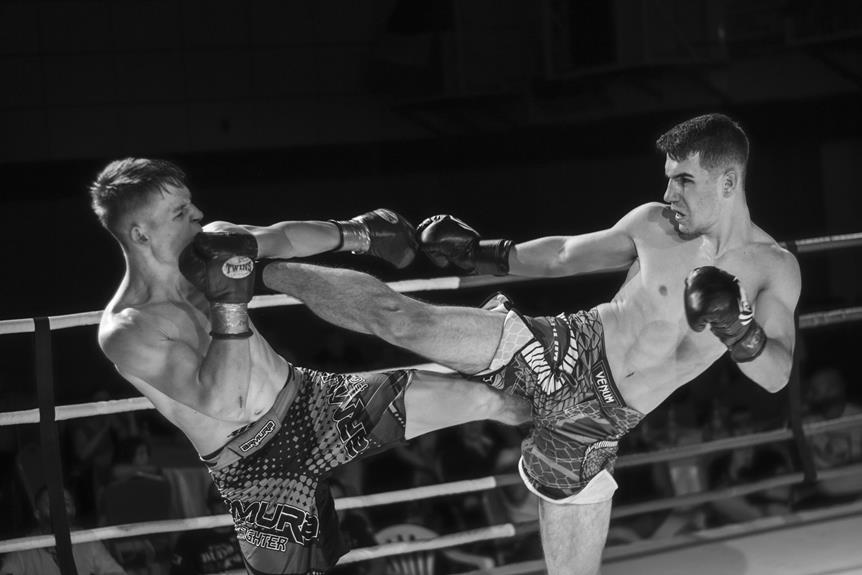In the high-stakes world of UFC fighting, the use of painkillers before a bout has become a subject of intrigue and speculation.
Surprisingly, the answer to the question 'Do UFC fighters take painkillers before a fight?' is not a simple one. While some may assume that fighters rely on these medications to mask pain and enhance performance, the reality is more nuanced.
Join us as we delve into the complex landscape of painkiller use in professional fighting, exploring the regulations, risks, and considerations that shape this controversial topic.
Key Takeaways
- UFC fighters may take weak painkillers like Ibuprofen, Aspirin, Naproxen, or acetaminophen before a fight for minor pain or discomfort.
- Stronger painkillers like narcotics are prohibited due to their risks and addictive nature. UFC fighters can only use them with Therapeutic Use Exemptions (TUEs).
- Most UFC fighters avoid taking painkillers before a fight due to adverse effects such as slower reaction speed, drowsiness, dulling of senses, and poor coordination.
- The adrenaline released during a fight helps the body focus on staying alive rather than feeling pain, reducing the need for painkillers.
Pre-Fight Painkiller Use
A small percentage of UFC fighters may choose to take weak painkillers before a fight for minor pain or discomfort. These painkillers, such as Ibuprofen, Aspirin, Naproxen, or acetaminophen, are considered weak and have minimal side effects like fatigue and drowsiness.
However, the majority of UFC fighters tend to avoid taking painkillers before a fight due to the potential risks and impact on fight performance. Adverse effects such as slower reaction speed, drowsiness, dulling of senses, and poor coordination can hinder their ability to perform at their best.
Additionally, the adrenaline released during a fight helps the body focus on staying alive rather than feeling pain. It is crucial for UFC fighters to prioritize their health, safety, and maintaining a level playing field, which often leads them to abstain from pre-fight painkiller use.
Adverse Effects of Painkillers
The use of painkillers before a fight can have adverse effects on UFC fighters' performance and overall well-being. While weak painkillers like Ibuprofen or acetaminophen may have minimal side effects, stronger painkillers can significantly impair fighters' reaction speed, coordination, and senses.
The adrenaline released during a fight helps the body focus on survival rather than feeling pain, making painkillers unnecessary in most cases. Moreover, the long-term effects of painkiller use, even weak ones, can lead to addiction and dependency.
UFC fighters prioritize their health and safety, which is why they often opt for alternative treatments such as physical therapy, massage, and natural remedies to manage pain.
It is essential for fighters to be aware of the potential dangers and risks associated with painkiller use and to seek proper medical guidance to ensure their overall well-being.
Therapeutic Use Exemptions (TUEs)
Therapeutic Use Exemptions (TUEs) are granted to UFC fighters in rare cases where they require the use of prohibited painkillers for legitimate medical reasons. The TUE approval process involves thorough evaluation by the United States Anti-Doping Agency (USADA) to ensure that the requested medication is necessary and does not provide an unfair advantage. The medical reasons for TUEs can include chronic pain management, recovery from surgery or injury, and other conditions that require the use of prohibited painkillers.
To provide a clearer understanding of the TUE process, the following table outlines the key aspects:
| TUE Approval Process | Medical Reasons for TUEs |
|---|---|
| Rigorous evaluation by USADA | Chronic pain management |
| Review of medical records and documentation | Recovery from surgery or injury |
| Assessment of the necessity and potential benefits | Other conditions requiring prohibited painkillers |
It is important to note that the approval of TUEs for strong painkillers is extremely rare, as the risks and addictive nature of these medications are carefully considered. UFC fighters must adhere to strict regulations and prioritize their health and safety while maintaining a fair competition environment.
Post-Fight Painkiller Use
After a fight, UFC fighters may use painkillers to manage their post-fight pain and aid in their recovery process. The intense physicality of a fight can leave fighters with various injuries and soreness that require pain management. However, it is crucial for fighters to be cautious about the long-term effects and potential risks associated with painkiller use.
While painkillers can provide temporary relief, excessive or prolonged use can lead to dependency and other adverse effects. Therefore, UFC fighters are encouraged to explore alternative pain management techniques such as physical therapy, massages, ice baths, and anti-inflammatory medications. These methods can help reduce pain and promote healing without the potential risks and drawbacks of painkiller use.
Dangers and Addictive Nature
Painkillers, particularly strong ones like narcotics, pose significant dangers and have an addictive nature, making their use among UFC fighters strictly prohibited. The risks and consequences associated with these medications are well-documented.
Narcotics can alter the brain and vital systems, potentially compromising the fighter's performance and overall well-being. Additionally, painkillers, even weaker ones, can lead to dependency and addiction, creating a dangerous cycle that can negatively impact an athlete's career and personal life.
The UFC prioritizes the health and safety of its fighters, as well as maintaining a fair and level playing field. Therefore, the use of painkillers, especially strong ones, is strictly regulated and discouraged. UFC fighters are encouraged to explore alternative methods of pain management and recovery that do not carry the same risks and potential for addiction.
Legal Painkillers for UFC Fighters
UFC fighters are permitted to use certain legal painkillers for specific situations and in compliance with regulations. While stronger painkillers like narcotics are prohibited due to their addictive nature and potential risks, some opioid painkillers such as hydrocodone and codeine are allowed for UFC fighters.
However, it is important to note that the use of these painkillers is closely monitored by the World Anti-Doping Agency (WADA) for patterns of misuse. UFC fighters must be cautious and aware of the potential dangers and risks associated with any painkiller use.
It is worth mentioning that these legal painkillers are not typically taken just before a fight, as they can have a negative impact on performance.
The use of painkillers in the UFC is limited to specific situations and must adhere to strict regulations to ensure fair competition.
Limited Use and Compliance
To ensure fair competition and maintain the health and safety of UFC fighters, their use of painkillers is carefully regulated and limited. The UFC has implemented strict pre-fight precautions and pain management strategies to prevent the abuse of painkillers.
Here are two key points to consider:
- Restricted Use:
- UFC fighters are discouraged from taking painkillers before a fight due to the potential negative impact on their performance.
- Strong painkillers, such as narcotics, are strictly prohibited due to their risks and addictive nature.
- Compliance:
- UFC fighters must adhere to the regulations set forth by the organization and the United States Anti-Doping Agency (USADA).
- The use of painkillers, even legal ones, is closely monitored to ensure that fighters do not exceed the allowed limits or engage in misuse.
Overall Perspective on Painkiller Use
In general, it is uncommon for UFC fighters to rely on painkillers before a fight, as they prioritize their performance and well-being. Painkillers carry potential risks and can have a negative impact on their performance in the octagon.
While some fighters may occasionally take weak painkillers like Ibuprofen or acetaminophen for minor discomfort, the majority avoid them due to adverse effects such as slower reaction speed, drowsiness, dulling of senses, and poor coordination.
The adrenaline released during a fight helps the body focus on staying alive rather than feeling pain. Stronger painkillers like narcotics are prohibited due to their risks and addictive nature.
UFC fighters understand the importance of maintaining a level playing field and prioritize their health and safety above all else. Therefore, the decision to use painkillers is carefully considered and regulated to ensure fair competition.
Frequently Asked Questions
Are There Any Circumstances Where UFC Fighters Are Allowed to Take Strong Painkillers Before a Fight?
Under certain circumstances, UFC fighters may be allowed to take strong painkillers before a fight. However, this is rare and highly regulated due to the potential negative impact on fighter performance.
How Do Painkillers Affect a UFC Fighter's Reaction Speed and Coordination During a Fight?
The use of painkillers before a UFC fight can negatively affect a fighter's reaction speed and coordination, compromising their performance. Additionally, painkiller use in UFC fights carries potential risks and is strictly regulated to ensure fair competition.
Can UFC Fighters Request a Therapeutic Use Exemption (Tue) for Over-The-Counter Painkillers Like Ibuprofen or Aspirin?
UFC fighters can request a Therapeutic Use Exemption (TUE) for over-the-counter painkillers like ibuprofen or aspirin. However, most fighters avoid taking painkillers before a fight due to potential negative effects on performance.
How Soon After a Fight Do UFC Fighters Typically Start Taking Painkillers to Manage Their Pain?
UFC fighters typically start taking painkillers to manage their pain immediately after a fight. These painkillers are used as part of their recovery process until the pain subsides. However, alternatives to painkillers are also explored to avoid dependency and adverse effects.
What Measures Are in Place to Prevent UFC Fighters From Developing a Dependency on Painkillers?
Preventing dependency on painkillers among UFC fighters involves strict regulations, such as prohibiting strong narcotics and monitoring opioid use. Additionally, alternative pain management techniques and education on the risks of addiction are implemented to ensure the fighters' well-being.
Conclusion
In conclusion, the use of painkillers among UFC fighters is a complex and regulated matter. While some fighters may choose to use weak painkillers before a fight, the majority tend to avoid their use due to potential adverse effects on performance.
Stronger painkillers are strictly prohibited, but fighters can apply for exemptions for medical purposes. Post-fight, painkillers are commonly used for recovery. However, it is important for fighters to exercise caution due to the dangers and addictive nature of painkiller use.
As the saying goes, 'With great power comes great responsibility,' and this applies to the careful consideration of painkiller use in the UFC.
- 15 Best Martial Arts Weapons (Fighting & Training) - October 14, 2024
- Is Fencing a Martial Art? (Yes, 4 Reasons Why) - October 14, 2024
- 7 Best Martial Arts for Self-defense Ranked (Highly Effective) - October 14, 2024










